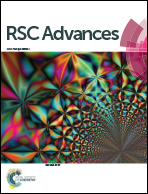One-step-immunoassay of procalcitonin enables rapid and accurate diagnosis of bacterial infection†
Abstract
Procalcitonin (PCT) (i.e. a precursor of calcitonin) attracts much attention as a reliable biomarker of bacterial infections because its concentration increases rapidly in the blood when bacterial infections occur in the body. Sepsis may occur due to indiscriminate and vigorous proliferation of infectious bacteria, and accordingly early diagnosis and treatment of bacterial infection are of crucial importance. However, current diagnostic methods for sepsis suffer from long assay time, multiple and complex assay steps, inaccuracy, and requirement of analytical equipments. The goal of this study is to develop an advanced one-step-immunoassay that enables quick and accurate diagnosis of sepsis through measuring the PCT concentration in patient sera, which is based on self-enhancement of optical detection signals from large gold particles (i.e. clusters of gold nanoparticles) that are formed on the agglomerates of PCT-bound 3-dimensional (3D) probes. The 3D probe is constructed through attaching polyclonal anti-PCT antibodies (IgGs) to the surface of a modified hepatitis B virus (HBV) capsid, where both tandem repeats of the B domain of Staphylococcal protein A (SPAB) and the hexa-histidine tag are inserted into each HBV core protein (i.e. subunit of HBV capsid). That is, anti-PCT IgGs are attached via strong interaction between the Fc region and surface-exposed SPAB. Furthermore, hook effect-free and PCT concentration-dependent optical signals were consistently generated by adding both bovine serum albumin (BSA) and nickel ions to patient sera and also by optimally adjusting the 3D probe concentration. Compared to conventional chemiluminescent microparticle immunoassay (CMIA) showing poor linearity of detection signals, this novel immunoassay accurately detected PCT with good linearity between PCT concentrations and optical signals in a wide range of PCT concentrations (0.05–200 ng mL−1) and also showed a sufficiently low limit of detection, resulting in 100% sensitivity and 100% specificity when tested with 30 sepsis patients and 30 healthy individuals.



 Please wait while we load your content...
Please wait while we load your content...